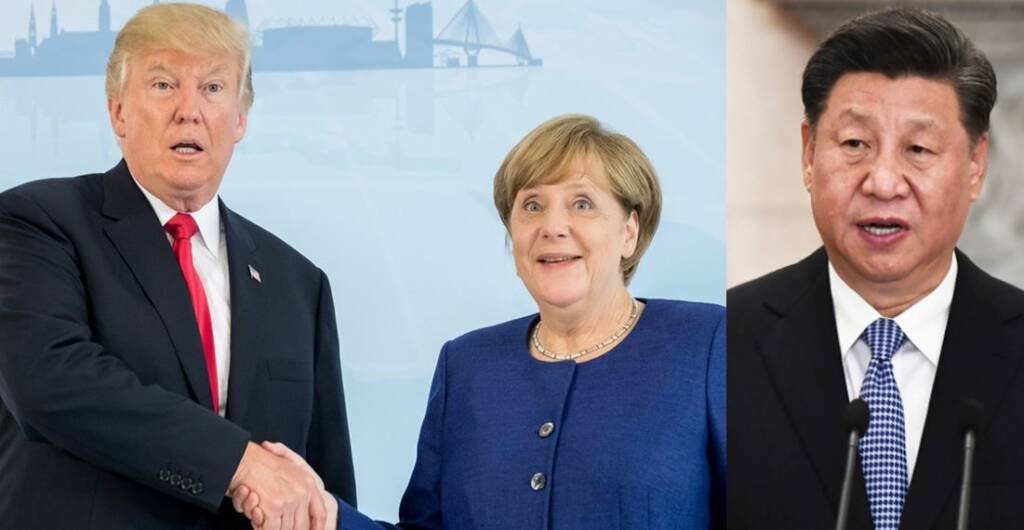The US is about to elect its new President and when the most powerful country on the face of the planet heads towards a poll, all other countries must prepare themselves for a post-poll diplomatic strategy. Angela Merkel’s Germany is no different. The German Chancellor Angela Merkel also needs a post-US Presidential poll strategy and it seems that she is preparing already. And from Berlin’s latest moves, it seems that Merkel is now reluctantly preparing herself for Trump 2.0.
Merely a week ahead of the US Presidential polls, two high-ranking German officials asked the US to work together with Europe in order to formulate a response against China. This direct call by Berlin to accept American leadership of the democratic world against China is rather unusual. Till now, Germany was adamant on rejecting Trump’s leadership on China. But it seems that the German Chancellor is now trying to correct Berlin’s pro-China image.
The German push for forging a united front against China is coming directly from the top, that is, the German Defence and Foreign Ministers.
The German Chancellor’s newfound hate for China is actually guided by the foreign policy calculus in White House that strongly depends on who comes to power- Trump or Biden. Trump, of course, wants to be the biggest China hawk in the world. On the other hand, Biden is a fierce Russia critic and a nominal China critic at the best.
In an ideal world, Merkel would want Biden to win. She is considered Beijing’s biggest well-wisher in Europe and as such Germany itself has deep business interests in the People’s Republic of China. Also, Merkel is a fierce Russia critic because she understands that the largely irrelevant Trans-Atlantic relationship between Europe and the US hinges vulnerably on the anachronistic worldview of the Russian threat to the free world.
But political leaders seldom get the liberty of living in an ideal world. In diplomatic powerplay, leaders have to very often make do with what they have, and not what they want to have. Merkel too has realised that she needs to prepare her administration for the likely prospect of Trump coming back to power.
The German Chancellor realises that if Trump comes back to power for a second term and Berlin still doesn’t mend its ways about China, then the White House might as well forget that Berlin used to be a close American ally. Merkel is herself in the twilight of her career and will retire next year. But if she doesn’t repair US-Germany ties by correcting Berlin’s pro-China image, then her successors will be left blaming her for landing them in an awkward position.
For a long time, the Merkel administration was hoping against hope that Berlin’s relentless jibes against Moscow and the Russian President Vladimir Putin would somehow preserve the Trans-Atlantic relationship.
But the Trump administration’s response to Merkel’s stubbornness has been to simply warm up to the Indo-Pacific countries like India, Australia, Japan, South Korea, Vietnam and the Philippines. And now, the German administration has come to realise that Europe and Germany are losing significance as the global spotlight shifts to the Indo-Pacific.
In midst of changing geopolitical realities, Merkel’s pro-China image wasn’t really helping Berlin win favour with US President Donald Trump.
Therefore, of late, Germany has been making moves like releasing an India-centric Indo-Pacific policy in a clear snub to China and raising the issue of Chinese human rights violations. However, Merkel is not criticising China because she hates China or wants to criticise China. She is doing so, only in order to ensure that Germany doesn’t fade into complete irrelevance if Trump comes back to power.
Today, Germany understands that futile attempts to paint Russia as the real villain and push the EU towards China, only antagonises the Trump administration even further. If Merkel doesn’t get rid of Berlin’s pro-China tag, then Germany might as well become completely irrelevant.
Therefore, even Germany’s Foreign Minister, Heiko Maas, feels that the future of Trans-Atlantic relations would be “determined by the right way of dealing with China”.
As such, the bright chances of a Trump re-election are compelling Angela Merkel to find the ‘right way’ of dealing with China. Ahead of the US Presidential polls, Berlin is therefore looking to shift goalposts from Moscow to Beijing in a bid to impress upon Trump, if he comes back to power for a second term.
